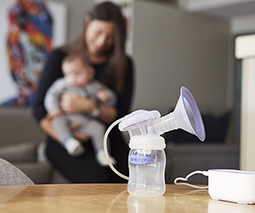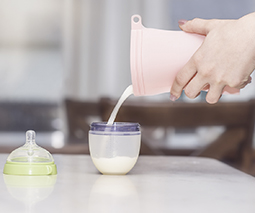No evidence that lactation cookies help make the milk flow

If you’re a new mum, it’s likely you’ve come across lactation cookies. Perhaps women in your mothers group are talking about them, or they’ve popped up in your Instagram feed, or you’ve seen them on the shelves while out shopping for your little one.
Breastfeeding mothers almost all question their milk supply at one time or another, and will naturally look for solutions to ensure their milk flow is meeting baby’s needs.
Lactation cookies, or biscuits, aren’t going to do women any harm. But there’s no evidence they can promote milk flow, either.
So if you’re really concerned about your milk supply, it’s best to see a professional who will be able to assess whether there’s a problem and recommend evidence-based solutions.
Galactogogues
Galactogogues is the word used to describe foods or drugs that promote or increase the flow of a mother’s breast milk.
There’s an ever expanding range of galactagogues available. Many are herbal products (like milk thistle, goats rue, and fenugreek), special foods (like cookies) or medications (such as domperidone and metoclopramide).
Studies have established these medications, particularly domperidone, are effective. They work by increasing levels of prolactin, the hormone that helps with milk production.
But very little evidence exists to support specific foods to increase milk supply.
From traditional to commercial
Various cultures encourage breastfeeding women to eat special foods to support them during lactation. This has led to the development in Western societies of “lactation cookies”.
Some companies make these commercially and sell them either online or in stores. They cost in the range of A$2 to A$3 per biscuit. There are also a myriad of recipes available online to bake at home.
Lactation cookies have common ingredients such as oats, flaxseed and brewer’s yeast. It’s not clear why these ingredients are believed to stimulate milk flow.
Anecdotal success stories can be found on online forums. Mothers post about the volumes of milk they can express before and after eating the cookies, and so on.
But scientific evidence suggesting these ingredients are effective in increasing milk supply is lacking.
Studies of this nature would actually be difficult to run. To see a true effect, scientists would need to follow a large number of lactating women and not only control their diets, but measure the amount of breast milk they expressed over a period. Determining the most effective dose of the cookies would also need to be trialled.
They won’t do any harm
Lactation cookies are safe to eat and won’t harm the baby. That being said, they do contribute energy (calories/kilojoules), so in excess may be a problem.
But women who are lactating have increased energy needs at this time anyway. So as long as the biscuits aren’t substituting for a healthy range of foods, they can be included.
Using biscuits like this might give some women a confidence boost that could assist in stressing less, and helping to increase milk production in that way. A small study looking at the use of herbal supplements in breastfeeding identified confidence was an important reason for using these products. And we know for mothers, confidence in their ability to breastfeed successfully can play a role in duration and success of breastfeeding.
If you’re worried, see a professional
Jumping in too early with galactagogues might send the message to mothers they are not able to produce enough milk to feed their baby. But we know most women are able to do this.
The simplest way to produce more milk is to feed more often, as the body responds to increased feeding by increasing prolactin and hence milk production.
For women who are concerned about low milk supply, relying only on lactation biscuits is not sensible. These women should consult a health professional such as a GP or lactation consultant who will provide appropriate support to optimise breastfeeding.
This story was originally published at The Conversation and was written by









